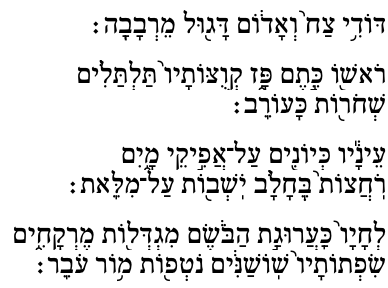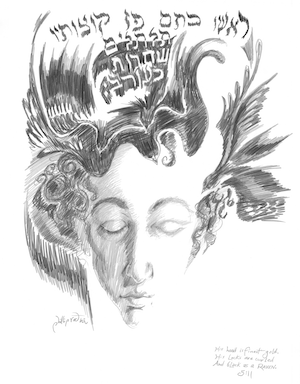Chapter 5:10-13

 My beloved is radiant and earthy
My beloved is radiant and earthy
He towers above ten thousand.
His head is burnished gold,
The wave of his hair
Shiny black as the raven,
His eyes like doves
By the flowing rivers
of milk and plenty.
His cheeks are a bed of spices,
Treasures of sweet perfume,
His lips red lilies
Wet with myrrh.
How shall I embrace this life that I have been given?
I begin with my breath.
Breathing fully and deeply, I take in the treasures of sweet perfume. I feel the earth beneath my feet, supporting me with its wide embrace. I open my eyes to color — rich hues of sapphire-blue, verdant shades of gracious greens, red lilies that celebrate themselves, gesturing seductively. I open my ears to the music of flowing rivers, to the flutter of wings, to the symphony of winds rushing through cedar.
In the Fever of Love ©2008 Shefa Gold. All rights reserved.
Illustrations ©2009 Phillip Ratner, courtesy of the Dennis & Phillip Ratner Museum and the Israel Bible Museum collection. All rights reserved.
Practice
Chant: Radiant and Earthy
Commentary
To love God is to embrace the paradox of opposites. Tzach can mean pure, milk, scorching, white, dazzling, radiant. Adom can mean ruddy, red, wine, earthy. When I can know my Beloved with my expanded heart capacities, expanding beyond mere mental faculties of the rational, then I can embrace the contradictions of my life. Then the Divine rises up (above ten thousand) and takes priority. Then I can see, with God, that apparent contradictions all belong to the One.
Bridge to Torah
Parshat Naso begins with an accounting of the Levitical families, detailing their work in transporting the Mishkan, through the wilderness journeys. Those journeys are filled with challenge and blessing. The challenges require us to access both our radiant clarity and our earthy practicality. The Song of Songs helps us to find those qualities. Naso also gifts us with the most ancient and holy Priestly Blessing, a threefold petition for blessing and safety, radiance and grace, Presence and peace. The blessing of the Song adds the blessings of beauty and delight.
Click to see Numbers 4:21-7:89 in Hebrew and English (JPS 1985) or the associated Torah Journeys page.
Questions for Contemplation
Can I hold the paradox of Tzach v’adom (radiant and earthy)? Can I feel myself as both Divine and human at once, knowing myself as an infinite eternal soul while embracing the truth of my mortality?
Resources
View Love at the Center Resources.
Click to see Song of Songs Chapter 5:10-13 in Hebrew with the English JPS (1985) translation.
